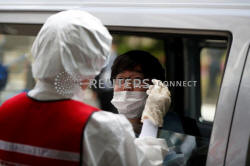 Japan
to adopt selective, rather than blanket, approach in
coronavirus tests Japan
to adopt selective, rather than blanket, approach in
coronavirus tests
 Send a link to a friend
Send a link to a friend
[June 08, 2020]
By Kaori Kaneko and Leika Kihara
TOKYO (Reuters) - Japan will stop short of
offering blanket coronavirus tests, and instead target the vulnerable
and those most at risk in seeking to prevent a second wave of
infections, the minister in charge of policies to combat the health
crisis said.
|
|
 Japan is currently well behind other major economies in the number
of completed coronavirus tests, drawing criticism from some experts
that it is not doing enough to trace the virus and prevent clusters. Japan is currently well behind other major economies in the number
of completed coronavirus tests, drawing criticism from some experts
that it is not doing enough to trace the virus and prevent clusters.
Yasutoshi Nishimura, Japan's economy minister who also oversees
coronavirus policies, defended Tokyo's approach, saying that
conducting effective polymerase chain reaction (PCR) tests on the
entire population would be difficult.
Even if someone initially tests negative, the person could return a
positive test days later depending on his or her behaviour during
that period. Ideally, Japan would test the entire population all at
once and isolate those who are positive, though that would be
"impossible realistically," he said.

"It's therefore important to ensure that those with higher risks (of
being infected) or deemed by doctors as in immediate need can get
tested," Nishimura told Reuters in an exclusive interview conducted
on Saturday.
"I don't side with the view that everyone should take PCR tests
regardless of their conditions. The key is to what extent we conduct
these tests, which we're debating now."
[to top of second column] |

Japan has a daily maximum testing capacity of more than 27,000 cases. But actual
tests being conducted is currently about 10,000 cases at the most, which
Nishimura said was due to a sharp decline in the number of new infections.
After peaking at 720, the number of infections has gradually fallen and now
hovers around 40 per day.
Japan so far has avoided the spike in infections seen in countries like the
United States and Italy. It now has about 17,200 infections with around 900
deaths, far lower than the 1.9 million cases and more than 110,000 deaths in the
United States.
(Reporting by Leika Kihara and Kaori Kaneko; additional reporting by Hiroko
Hamada; Editing by Shri Navaratnam)
[© 2020 Thomson Reuters. All rights
reserved.] Copyright 2020 Reuters. All rights reserved. This material may not be published,
broadcast, rewritten or redistributed.
Thompson Reuters is solely responsible for this content.
 |